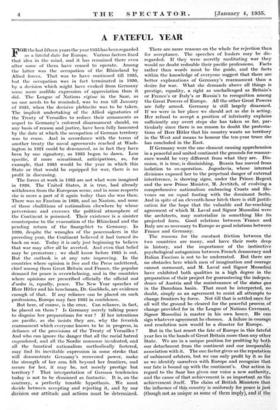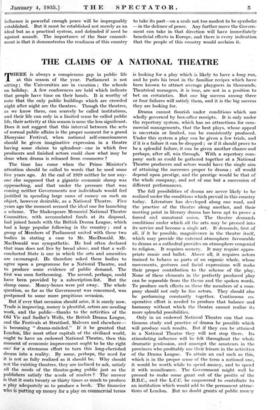A FATEFUL YEAR
FOR the last fifteen years the year 1935 has been regarded as a fateful date for Europe. Various factors fixed that idea in the mind, and it has remained there even after some of them have ceased to operate. Among the latter was the occupation of the Rhineland by Allied forces. That was to have continued till 1935, but the occupation was in fact terminated in 1930, by a decision which might have evoked from Germany some more audible expression of appreciation than it did. The League of Nations regime in the Saar, as no one needs to be reminded, was to run till January of 1935, when the decisive plebiscite was to be taken. The implicit undertaking of the Allied signatories of the Treaty of Versailles to reduce their armaments as sequel to Germany's enforced disarmament should, on any basis of reason and justice, have been fully honoured by the date at which the occupation of German territory was to cease. And in accordance with the terms of another treaty the naval agreements reached at Wash- ington in 1921 could be denounced, as in fact they have been by one signatory, as 1935 began to dawn. Less specific, if more sensational, anticipations, as, for example, that 1985 would be the year in which this State or that would be equipped for war, there is no profit in discussing.
The forces at work in 1935 are not what were imagined in 1920. The United States, it is true, had already withdrawn from the European scene, and in some respects she is more a part of it again today than she was then: There was no Fascism in 1920, and no Nazism, and none of those ebullitions of nationalism elsewhere by whose perversions and excesses the political atmosphere of the Continent is poisoned. Their existence is a sinister counterpoise to the evacuation of the Rhineland and the pending return of the Saargebiet to Germany. In 1920, despite the wrangles of the peacemakers in the preceding year, the Continent believed it had turned its back on war. Today it is only just beginning to believe that war may after all be averted. And even that belief may be premature ; we shall know before 1935 is out. But the outlook is at any rate improving. In the countries where opinion is free and the Press unfettered, chief among them Great Britain and France, the popular demand for peace is overwhelming, and in the countries where opinions are prescribed officially the official mot d'ordre is, equally, peace. The New Year speeches of Herr Hitler and his henchman, Dr. Goebbels, are evidence enough of that. If any reliance can be placed on such professions, Europe may face 1935 in confidence.
But here, of course, is the crux. Can reliance, in fact, be placed on them ? Is Germany merely talking peace to disguise her preparations for war ? If her intentions are pacific, as she insists they are, why the feverish rearmament which everyone knows to be in progress, in defiance of the provisions of the Treaty of Versailles ?
And who can ignore the danger that all the racial hatred engendered, and all the Nordic nonsense inculcated, and all the fanatical nationalism methodically fostered, may find its inevitable expression in some stroke that will demonstrate Germany's recovered power, make the strength of her arm felt beyond her frontiers, and secure for her, it may be, not merely prestige but territory ? That interpretation of German tendencies today is not to be dismissed as fantastic. It is, on the contrary, a perfectly tenable hypothesis. We must decide between accepting and rejecting it, and by our decision our attitude and actions must be determined. There are more reasons on the whole for rejection than for acceptance. The speeches of leaders may be dis- regarded. If they were secretly meditating war they would no doubt redouble their pacific professions. Facts rather than words must be the guide, and the facts within the knowledge of everyone suggest that there are better explanations of Germany's rearmament than- a desire for war. What she demands above all things is prestige, equality, a right as unchallenged as Britain's or France's or Italy's or Russia's to recognition among the Great Powers of Europe. All the other Great Powers are fully armed. Germany is still largely disarmed. If we were in her place we should act as she is acting. Her refusal to accept a position of inferiority explains sufficiently any overt steps she has taken so far, par- ticularly since there is no reason to doubt the protesta- tions of Herr Hitler that his country wants no territory in the West and means to honour the ten-year truce she has concluded in the East.
If Germany were the one element causing apprehension in a peaceful and united continent the grounds for reassur- ance would be very different from what they are. Dis- union, it is true, is diminishing. Russia has moved from isolation to co-operation. Jugoslavia, whose internal divisions exposed her to the perpetual, danger of external interference, is showing signs, under the Prince _Regent; and the new Prime Minister, M. Jevtitch, of evolving a comprehensive nationalism embracing Croats and Slo- venes on an equal footing with the dominant Serbs. And in spite of an eleventh-hour hitch there is still justifi- cation for the hope that the valuable and far-reaching agreement of which M. Laval and Signor Mussolini were the architects, may materialize in something like its projected form. Good relations between France and Italy are as necessary to Europe as good relations between France and Germany.
The reasons for the constant friction between the two countries are many, and have their roots deep in in history, and the importance of the instinctive psychological antagonism between French democracy and Italian Fascism is not to be underrated. But there are no obstacles here which men of imagination and courage cannot surmount, and M. Laval and Signor Mussolini have exhibited both qualities in a high degree in the preparation of their project for guaranteeing the indepen- dence of Austria and the maintenance of the status quo in the Danubian basin. That must be interpreted? no doubt, simply as an agreement, to resist all attempts to change frontiers by force. Not till that is settled once tor all will the ground be cleared for the peaceful process, of change provided for in the League of Nations Covenant.
Signor Mussolini is master in his own house. He' can sign whatever agreement he chooses. A failure in courage and resolution now would be a disaster for Europe.
But in the last resort the fate of Europe in this fateful year lies in the hands of Great Britain more than any other State. We are in a unique position for profiting by both our detachment from the continent and our inseparable association with it. The one factor gives us the reputation of unbiassed arbiters, but we can only profit by it so far as we. identify ourselves with Europe and recognize that our fate is bound up with the continent's. Our action in regard to the Saar has, given our voice a new authority, and the cause of that achievement is as important as the achievement itself. The claim of British Ministers that the influence of this country is uniformly for peace is just (though not as unique as some of them imply), and if the influence is powerful enough peace will be impregnably established. -But it must be established not merely as an ideal but as a practical system, and defended if need be - against assault. The importance of the Saar commit- ment is that it demonstrates the readiness of this country to take its part—on a scale not too modest to be symbolic —in the defence of peace. Any further move the Govern- ment can take in that direction will have immediately beneficial effects in Europe, and there is every indication that the people of this country would acclaim it.







































 Previous page
Previous page